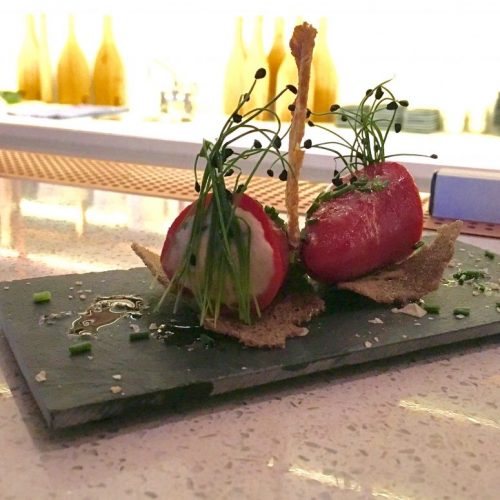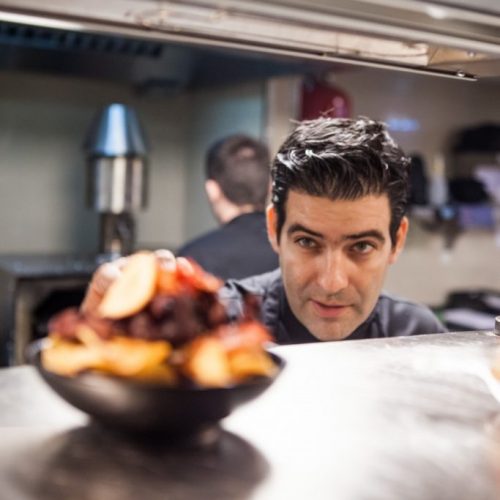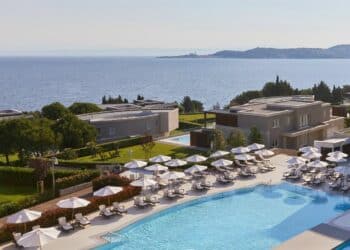The team behind Cocktail Kitchen explains how Jumeirah Lakes Towers’ newest licensed venue showcases the best of food and beverage, while bringing Dubai up to the times with accessible, affordable and spontaneous hospitality
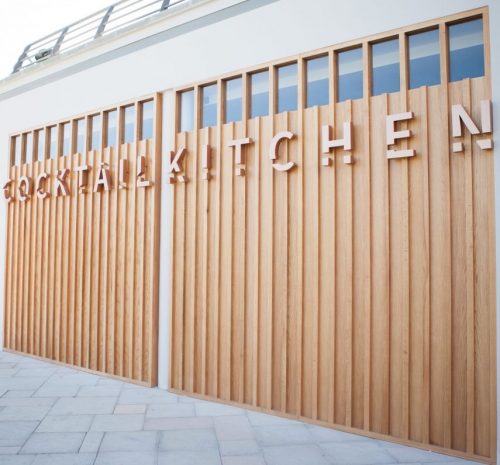
The concept of cocktail kitchen is all in the name – “a balance of great beverages and food” – according to John Gillespie, who founded the venue along with Giorgio Vallesi, his ex-colleague of beverage marketing, sales and distribution organisation, Maritime and Mercantile International (MMI).
The two friends were brand managers for the company’s products, and then went on to start up their own beverage-related businesses. Gillespie founded Tonique Consultancy, which provides brand-focused services for the drinks industry, while Italian native Vallesi set up Limeline Premium Beverages, a sales, marketing and distribution company for artisanal soft drinks.
Having specialised in the beverage side of the hospitality business, the pair agree that “food is the challenge”, however Gillespie admits it would have been “naïve” to create a simple cocktail bar. “The business model wouldn’t work,” he says. “Food is something people are passionate about. It’s important we have the balance with the food and drinks and I think the name reflects that.”
Having each been in Dubai for around 10 years, Gillespie and Vallesi spotted an opportunity for an evening venue that fills the space between high-end and low-end; something accessible, relaxed and spontaneous. “We wanted something that reflects our values,” Gillespie says. “I think it’s the next level of what Dubai needs. Dubai is saturated with F&B concepts and I think people are conscious about where they go now, how much they spend, and how often they go out.”
Vallesi adds: “The main idea was to bring back the essence of the hospitality business. This business model is something that has been missing in Dubai and there’s a need for normality, a place you can feel at home. Our brand positioning is a casual, customer-focused experience.”
The venue has a trendy, retro, industrial vibe with steel chairs, wooden ceiling beams, and a cork floor in The Back Room – a private area for events and cocktail masterclasses. The urban feel is softened with copper, peach and sage green tones throughout and a number of quirky highlights feature, such as the neon Cocktail Kitchen sign that greets guests at the main entrance of the bar, which gives the restaurant a freestanding feel, even though it is part of the Armada Blue Bay Hotel, located in Cluster P of Jumeirah Lakes Towers.
The potential of the location was carefully researched, and if popular neighbouring venues Mythos and Nola are anything to go by, Cocktail Kitchen already has a strong captive audience. “There’s enough community with Jumeirah Lakes Towers and Jumeirah Village behind that, so it’s just ensuring we have good quality service – there will be enough business for everyone,” says Vallessi.
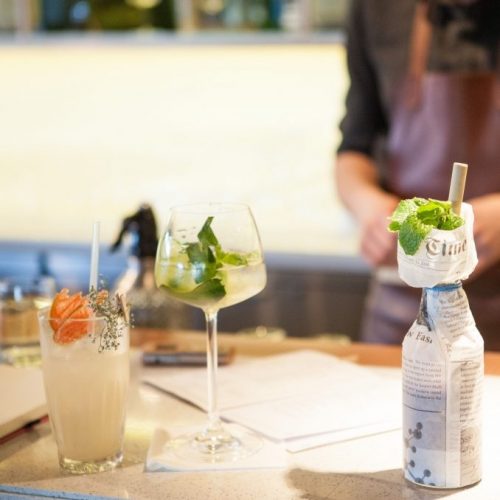
Gillespie agrees that excellent service really is paramount to ensuring the project is a success, and this is down to the recruitment and training. “Training is ongoing, it doesn’t stop and the key to the success of this project is the people; development of the people and recognising that in a team there are so many characters. How do you get the best out of them to allow them to excel? So it’s sharing our experience and hopefully that will translate to the customer experience,” he says, explaining that as a consultant, he advises on F&B projects and conducts training, and is now applying these skills and expertise to Cocktail Kitchen.
As is often the case in Dubai, the recruitment process has been a challenge for Vallessi and Gillespie, who haven’t used agencies at all, instead relying on their strong networks of industry contacts and word-of-mouth. “You start with the heads of department, then through a friend of a friend or people you see when you go out, and that’s how you build the team; it’s been difficult,” admits Vallessi. However, despite the usual recruitment challenges associated with Dubai, Cocktail Kitchen has managed to attract experienced talent who have been in the region for a few years already.
Head of bar is Romanian national Valentin Chitu, who previously worked for Solutions Leisure, the company behind Dubai nightspots Q43 and Lock Stock & Barrel. Heading up the culinary team is Argentinian head chef Javier Birman, who worked at Mediterranean restaurant Boca in DIFC and has lived and worked in more than 25 countries. Meanwhile, Tim Smith, general manager, was assistant general manager of Frioul Dubai and assisted with the opening of sister venue Pacha Ibiza. He also has London’s The Dorchester Hotel and dining and entertainment venue, Sketch on his CV.
Smith says he was attracted to his current role because the concept of Cocktail Kitchen was more in line with the types of venues he had seen developing in London: “I read the brief and it was something a bit trendier and more fashionable ̶ where London was going. A completely different concept that wasn’t in Dubai. It’s a bit more fun and playful.”
“We’re trying to find something new and exciting that people haven’t seen before – we’re bringing Dubai back up to the times” – Tim Smith
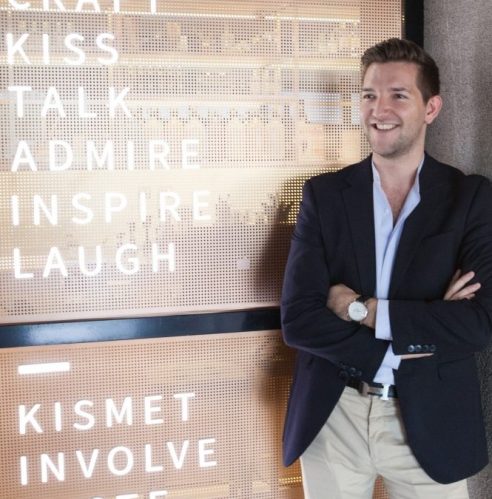
One big trend being seen in London, and which Cocktail Kitchen is bringing to Dubai is Vermouth, a fortified wine. There are 56 variations of the product on the menu. “It’s about the playfulness of the Vermouth, the background of it. It’s not overpowering, it’s easy to drink and something you can have at aperitivo time; it’s very palatable,” says Smith.
The Vermouth can be softened with a splash of soda, which explains why there are glass and mesh soda siphons dotted around, adding to the funky, retro atmosphere of the venue. Quirky pieces such as this are part of the brand’s USP, and the team has gone to great lengths to source unusual items for the interiors.
“[Procurement] has been the fun part,” says Smith. “We sourced our teapots from Japan, which are made of glass and olive wood. We use them for tea but also for brewing some of the cocktails.”
Meanwhile all of the furniture is from the UK and the chopping boards, ice boxes and wine boxes are from Italy. “We’re trying to find something new and exciting that people haven’t seen before – we’re bringing Dubai back up to the times,” Smith adds.
And for the glassware items, Chitu, head of bar, explains that Cocktail Kitchen is looking to source custom-made products from a glass manufacturer in Al Quoz, which currently recycles the venue’s water bottles. Minimising waste is just as important when it comes to the cocktail ingredients he adds, offering the example of pineapple – the pulp is used in the cocktails and the leaves are dehydrated and used as garnish.
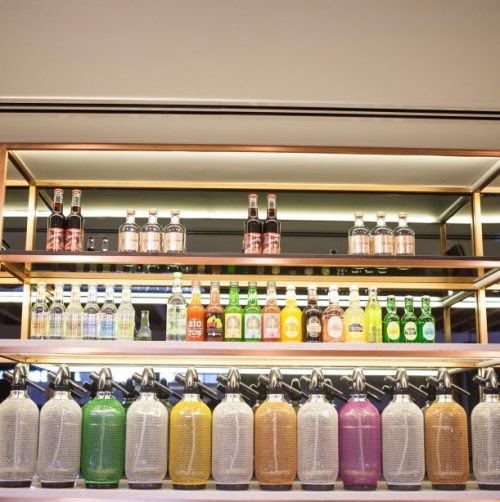
With Valessi having launched his own company centred on non-alcoholic beverages, he and Gillespie are keen to ensure that as much effort is put into the mocktail selection as the cocktail menu. The mocktail list comprises two sections, one being ‘Angel’s Share’, which contains creations such as Allones Bonnes (red grape juice, nougat, anise, citrus and fresh mint) and Beet’le Juice (organic beetroot juice, blueberry, violet mustard, lemon and anise). The ‘We are Cordial People’ section comprises cordial-based mocktails, such as Pain in the Grass, which contains Thorncroft wild nettle cordial, cucumber soda, fresh basil, cucumber and lime leaves. “We’re trying to revive cordial as a beverage, just to remind people that some time ago we used to drink cordial with spritzers,” says Chitu, highlighting again the retro touchpoints of Cocktail Kitchen.
He explains that the menu was created through a team effort, which involved five months of weekly tastings with the team. “It’s a fun way to end the week! Every Thursday we prepared drinks and the team told us whether it was good or if we needed to change something, so the tone and the direction has been dictated by that. Everyone had an input and moving forward everyone has a bit of passion and ownership as a result,” says Chitu.
Gillespie adds that the tastings also helped the team to refine the drinks and remove the subjectivity from the menu creation process. “The management all have opinions but it was important that the beverage menu wasn’t designed for us, it was designed for the consumer. So having a cross-mix of the team helped us refine the drinks and gave us a better understanding of what you like, rather than what I like”.
Another interesting aspect of the cocktail menu is the ‘Savoury and Savoured’ selection of alcoholic cocktails, which is focused on ingredients more likely to be found in the kitchen than the bar. “For example we infuse cognac with feta cheese to make a twist of a classic Sidecar cocktail. We also infuse Vermouth with roasted chestnuts for the Negroni Castana,” says Chitu.
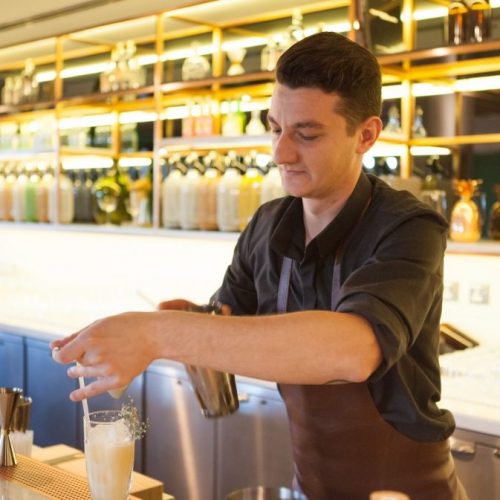
The ‘Nibble Before you Dribble’ menu is another example of the dualism between the food and beverage offer, with light sharing dishes that go with certain cocktails. Each dish is priced at AED 30 and the menu includes options such as arancini (four mushroom risotto, basil mayonnaise and mozzarella) and stuffed piquillo peppers with smoked mackerel, chives and labneh. Even certain items on the main menu are inspired by cocktails explains Chef Birman, who studied previously as a sommelier and highlights the Bloody Mary beef and the Ricard salmon as two of his favourites. The salmon is poached in anise liquor and fennel seeds, while the beef dish is braised for up to five hours in the cocktail mixture, and then served up with fresh Bloody Mary sauce so that the diner experiences two preparations of the same ingredients. An Argentinian native, Birman sources the beef from his home country, however he is also a strong proponent of purchasing locally, particularly when it comes to fruit and vegetables, much of which is supplied by Appletree, and fish and seafood, which comes from the Deira fish markets.
“The beef is 100% grass-fed, a special rib-eye, which is very tender and has lots of marbling. We pick the fish very well; we go to the fish markets and we use the offcuts in our sauces, so it’s all very natural, we don’t use any powders in the process. We use sea bream, seabass and sultan Ibrahim, and also live mussels.”
And while sourcing quality products is very important for the brand, Vallesi is keen to add that affordability is “a strong part of the concept”.
“It’s finding the right balance between quality products and a price that is reasonable, and the reason we do this is because the plan is to have this business for many years,” he says.
Valessi and Gillespie have signed a 10-year lease on Cocktail Kitchen and have no plans to expand the brand at the moment, preferring to focus on perfecting their first product.
“We have no intention of opening another 10 in the next five years; we want something sustainable. We are two independent guys and what we’ve built is enough to make us a living, but at the same time it’s taking a different approach to where we feel Dubai is going. It’s people with a decent salary but with a lifestyle that leans more toward this sort of thing, where you can go out a couple of times a week, and I think that’s our idea for the price positioning,” says Vallesi.
Gillespie adds: “If the product is good, affordable and accessible, people will come again, so it’s an educational thing. Let’s teach people the art of drinking – drink less, but better.”
